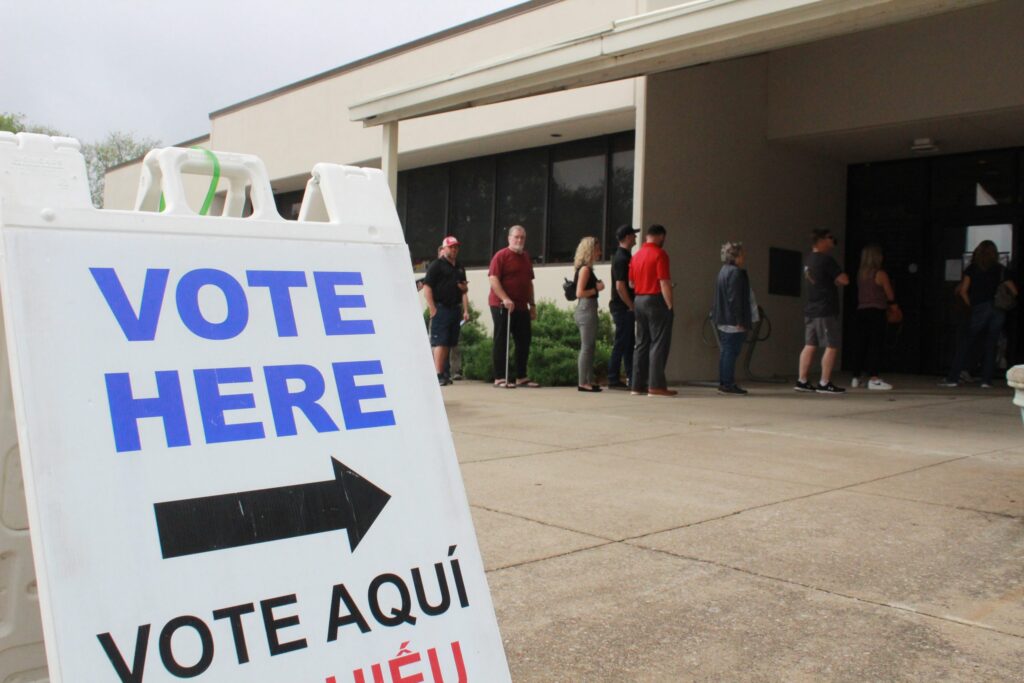Newly elected and reelected school board trustees took their oaths last week across Tarrant County, finalizing outcomes from May elections that once again saw low voter turnout.
Fort Worth ISD trustees were sworn in May 13. Keller ISD followed on May 14. In both districts — and across much of the county — only a small fraction of eligible voters participated in the races that will shape school leadership for years to come.
Across Fort Worth-area districts, turnout ranged from just over 9% to under 3%, according to data compiled by the Fort Worth Report. Keller ISD, where all three trustee positions saw contested races, had the highest turnout: 9.1%. White Settlement ISD, which had one contested race, had the lowest turnout, at 2.6%.
“I would hope to see increased turnout in the future,” said Michelle Bauml, a Texas Christian University professor who specializes in civic education. “Sadly, I am not sure that we will see many changes in terms of local election turnout until civic education becomes more of a priority in our schools.”
School board elections determine who oversees multimillion-dollar budgets, student achievement strategies and critical decisions like school closures and superintendent hires. Still, they continue to draw only a fraction of eligible voters to the polls, Bauml said.
Here’s how turnout broke down across several districts in May:
Some districts, including Everman and Lake Worth ISDs, did not hold elections in May. In Northwest ISD, incomplete registration totals made comparison difficult. Fort Worth ISD elects trustees through single-member districts, meaning only voters in specific geographic areas vote for each seat. All other districts elect trustees at-large, allowing all registered voters in the district to participate in each race — resulting in higher voter registration counts.
Keller ISD’s relatively higher turnout compared to previous years may have been driven by community interest following a proposal to split the district in two — a plan that was later scrapped.
Voters elected three candidates who opposed the split: Randy Campbell, Jennifer Erickson and incumbent Chelsea Kelly.
In Fort Worth ISD, five board seats were up for grabs — though two races were uncontested — amid broader scrutiny of school closures, academic performance and a looming $22.7 million budget restructure.
Still, turnout hovered under 5%.
Bauml, who directs a free civics camp for middle school students through TCU, said early education efforts could help long term but won’t produce overnight change.
“I am optimistic that things can change, but it will take time and coordinated effort to make it happen,” she said.
Most school board elections occur in May, outside of general election cycles, and are often held separately from higher-profile contests for president, governor or Congress. That may soon change, as efforts to consolidate municipal and county elections with larger cycles have gained some attention in recent years.
Senate Bill 1209, introduced by state Sen. Bryan Hughes, R-Mineola, would move May municipal and school board elections to Tuesdays in November statewide. The legislation, which passed the Texas Senate and is currently in the House elections committee, aims to reduce election costs and increase turnout by consolidating local races with higher-profile contests.
Critics argue a future shift could make voting harder for people who can’t take time off work during the week and may reduce the number of polling places, especially if schools opt out of serving as vote centers due to security concerns.
The session closes June 2.
In the meantime, advocates like Bauml say more voter education — and earlier exposure to the importance of local governance — may offer the best hope for long-term improvement.
For now, the newly sworn-in trustees will govern districts where the vast majority of their constituents stayed home.
Matthew Sgroi is an education reporter for the Fort Worth Report. Contact him at [email protected] or @matthewsgroi1.
At the Fort Worth Report, news decisions are made independently of our board members and financial supporters. Read more about our editorial independence policy here.
Related
Fort Worth Report is certified by the Journalism Trust Initiative for adhering to standards for ethical journalism.
Republish This Story
![]()


